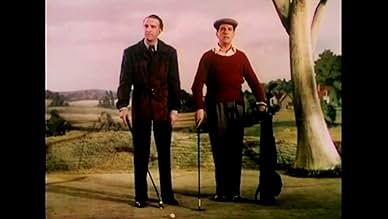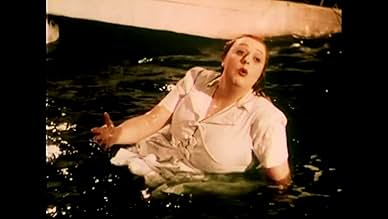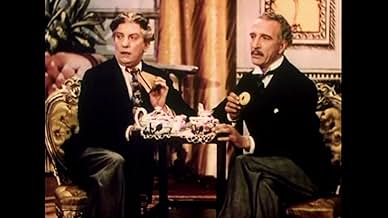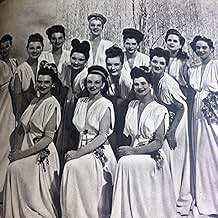AVALIAÇÃO DA IMDb
5,7/10
118
SUA AVALIAÇÃO
Adicionar um enredo no seu idiomaAn aging music-hall performer returns to London believing he's the star of a new show. When he discovers that he's only slated to be the understudy, his daughter sabotages the revue's star i... Ler tudoAn aging music-hall performer returns to London believing he's the star of a new show. When he discovers that he's only slated to be the understudy, his daughter sabotages the revue's star in order to get him back into the spotlight.An aging music-hall performer returns to London believing he's the star of a new show. When he discovers that he's only slated to be the understudy, his daughter sabotages the revue's star in order to get him back into the spotlight.
- Direção
- Roteiristas
- Artistas
Lucas Hoving
- Dancer
- (as Lucas Hovinga)
Scotty McHarg
- Bill
- (as 'Scotty' McHarg)
Avaliações em destaque
A good musical must have some tuneful melodies,reasonable book and not outsmart its welcome.This film fails on all three counts.Furthermore it has Sid Field in the lead.Now whilst this may be a good thing for music hall historians he simply is not up to the lead role in a film.Furthermore if you don't enjoy the humour of his sketches then you really are stuck.He has a good supporting cast in Claude Hulbert Sonnie Hale and Jerry Desmonde.It is difficult to understand why Rank let Wesley Ruggles direct it,then allow it to be released in a version over two hours long.By 1950 Rank was overdrawn by millions of pounds and brought in John Davis to wield the axe.
Rank's ruinously expensive attempt to make a film star out of West End sensation Sid Field immediately acquired legendary status when it crashed and burned with both critics and at the boxoffice taking with it the career of director Wesley Ruggles and setting back that of Kay Kendal for several more years.
Predating British film comedies of the fifties and sixties which showcased British television comedians in Technicolor, like most really bad films the biggest sin 'London Town' commits is the one of simply being very dull, to the extent that for the next fifteen years it was produced as Exhibit 'A' whenever the case was argued that the British simply couldn't make musicals.
Predating British film comedies of the fifties and sixties which showcased British television comedians in Technicolor, like most really bad films the biggest sin 'London Town' commits is the one of simply being very dull, to the extent that for the next fifteen years it was produced as Exhibit 'A' whenever the case was argued that the British simply couldn't make musicals.
Petula Clark stars as a young girl in this confused (post-modernist ?) musical, with a whole cast of down-on-their-luck stars producing a variety of songs on some very expensive sets that don't seem to _quite_ make sense.
There is evidence of much cutting, particularly in the 'gay' scene (well that's what it looked like to me) which cuts out and runs out of true, but also with the fact that the story is often incoherent and introduces unexplained new elements (such as 'The Amsted Way' ??).
The comedy act at the end is terrible, and the lead is as well.
Wildly expensively made in Technicolour, perhaps as an experiment ? (Maybe that's why J. Arthur kept in black & white for so long).
There is evidence of much cutting, particularly in the 'gay' scene (well that's what it looked like to me) which cuts out and runs out of true, but also with the fact that the story is often incoherent and introduces unexplained new elements (such as 'The Amsted Way' ??).
The comedy act at the end is terrible, and the lead is as well.
Wildly expensively made in Technicolour, perhaps as an experiment ? (Maybe that's why J. Arthur kept in black & white for so long).
Over here in the UK, we frequently see scenes from this film on programmes like 'heroes of comedy' or 'Music Hall heroes' - that type of thing. The films star, Sid Field was a very popular (and funny) comedian at the tail end of the variety period before TV appeared and very little film of him was made. So the sketches and 'turns' from London Town are shown as an illustration of him in action. We recently bought the DVD of this film purely to see the snatches of Sid Field in action, as we both find him hilarious in a rather old-fashioned and unsophisticated way. What we weren't prepared for was the pure awfulness of the rest of it - the plot is almost non-existent, the writing and script are poor and the direction is all over the place. Happily, Sid Field in full flow makes up for all of this. OK, I admit that someone tripping up on stage is not the height of comedy class, but he does it so well, and the scene with the camera has me hooting with laughter. So three cheers for Sid, a resounding raspberry for the rest of it!
Now that the full film is finally available on DVD, complete with the deleted scenes restored in the right order, the film is no longer to be seen as such a turkey. It lost money, embarrassed it's backer's, affected careers, and was badly directed by Wesley Ruggles, brought in at Sid Fields request. It still suffers from a missing laughter track in some sketches, and due to his sudden demise, few know Sid Fields huge reputation as a top comic. Rank tore the film apart in efforts to get it through the US censor system, added the cost of the rebuild of Shepperton to the bills, and restricted the distribution to the UK at first. The film is not bad, just disjointed in places, with a poor story line, but the musical numbers work fine. Sid Fields routines are flat because there is no audience roaring with mirth at his every prat fall and joke. The 1980's issue made things worst, with numbers chopped and altered in order, making it a mess from start to finish. But now restored, even the joke apology ending, and re-ordered, it works as a fine nostalgic look at a 1940's review show, in excellent colour, and now very pristine look. Kay Kendal said it ruined her career, yes, but because it stalled at the US box office, not because it was bad, after all it did good business in the UK when new. She had been slated for stardom before the film, and lots of publicity was given , that backfired when they could not sell it to the US distributors, leaving her career in limbo.
Você sabia?
- CuriosidadesThis film was Britain's first major Technicolor musical and also became the most notorious critical and box-office flop of the postwar British cinema and the largest bomb ever for its production company, the famed J. Arthur Rank Organisation.
- Cenas durante ou pós-créditosClosing credits: The characters depicted in this photoplay are fictional any similarity to actual persons living or dead is purely coincidental.
- Versões alternativasUK premiere version (126 mins) UK theatrical release print (95 mins)(shortened, re-edited) US theatrical release print (75 mins)
- ConexõesFeatured in Saturday Live: Pilot (1985)
- Trilhas sonorasYou Can't Keep a Good Dreamer Down
(uncredited)
Music by Jimmy Van Heusen
Lyrics by Johnny Burke
Performed by Sid Field
Principais escolhas
Faça login para avaliar e ver a lista de recomendações personalizadas
Detalhes
- Data de lançamento
- País de origem
- Idioma
- Também conhecido como
- My Heart Goes Crazy
- Locações de filme
- Sound City, Shepperton, Surrey, Inglaterra, Reino Unido(studio: made at Sound City Studios Shepperton England)
- Empresa de produção
- Consulte mais créditos da empresa na IMDbPro
Bilheteria
- Orçamento
- £ 1.000.000 (estimativa)
- Tempo de duração2 horas 6 minutos
- Proporção
- 1.37 : 1
Contribua para esta página
Sugerir uma alteração ou adicionar conteúdo ausente

Principal brecha
By what name was Belezas em Revista (1946) officially released in India in English?
Responda


















